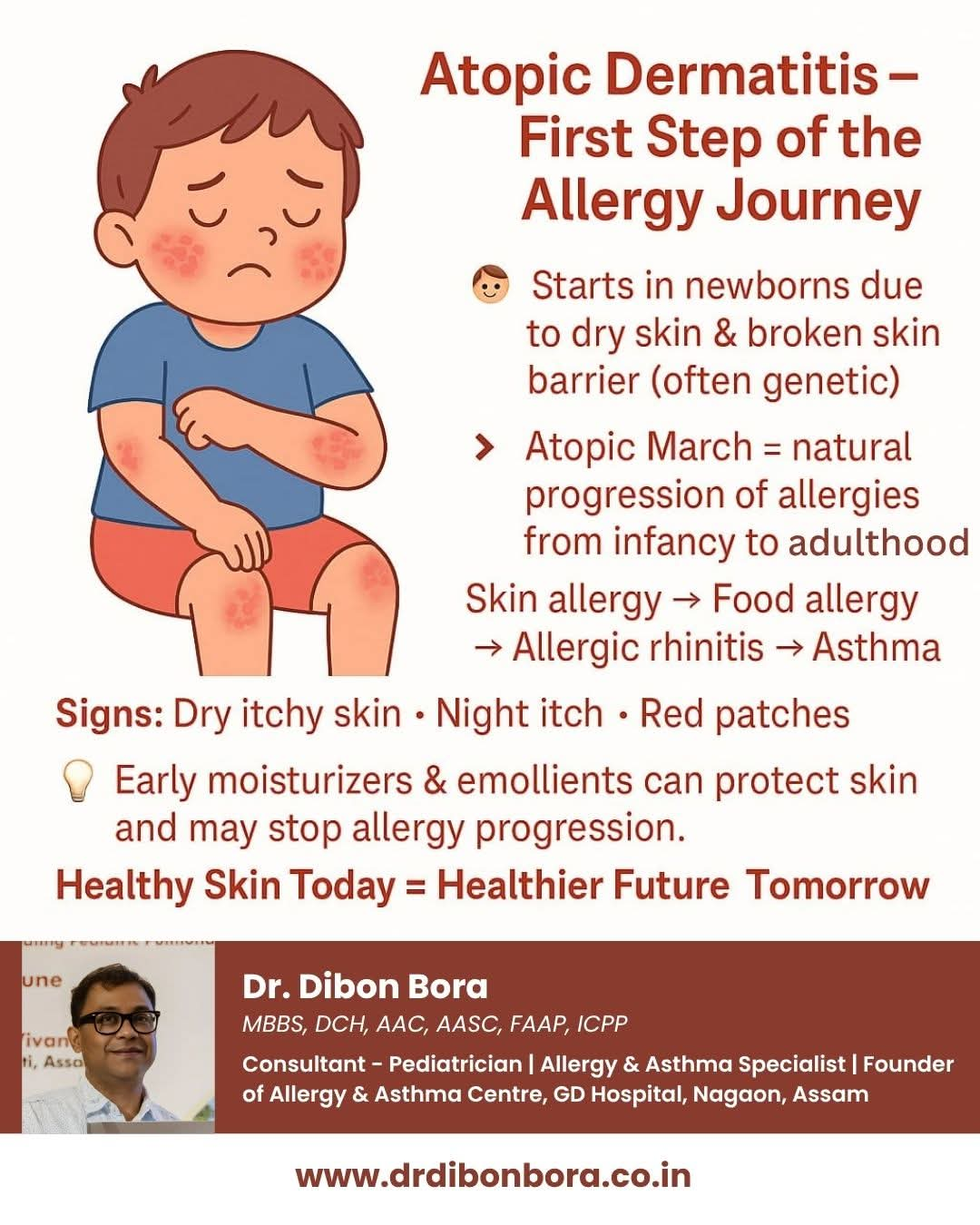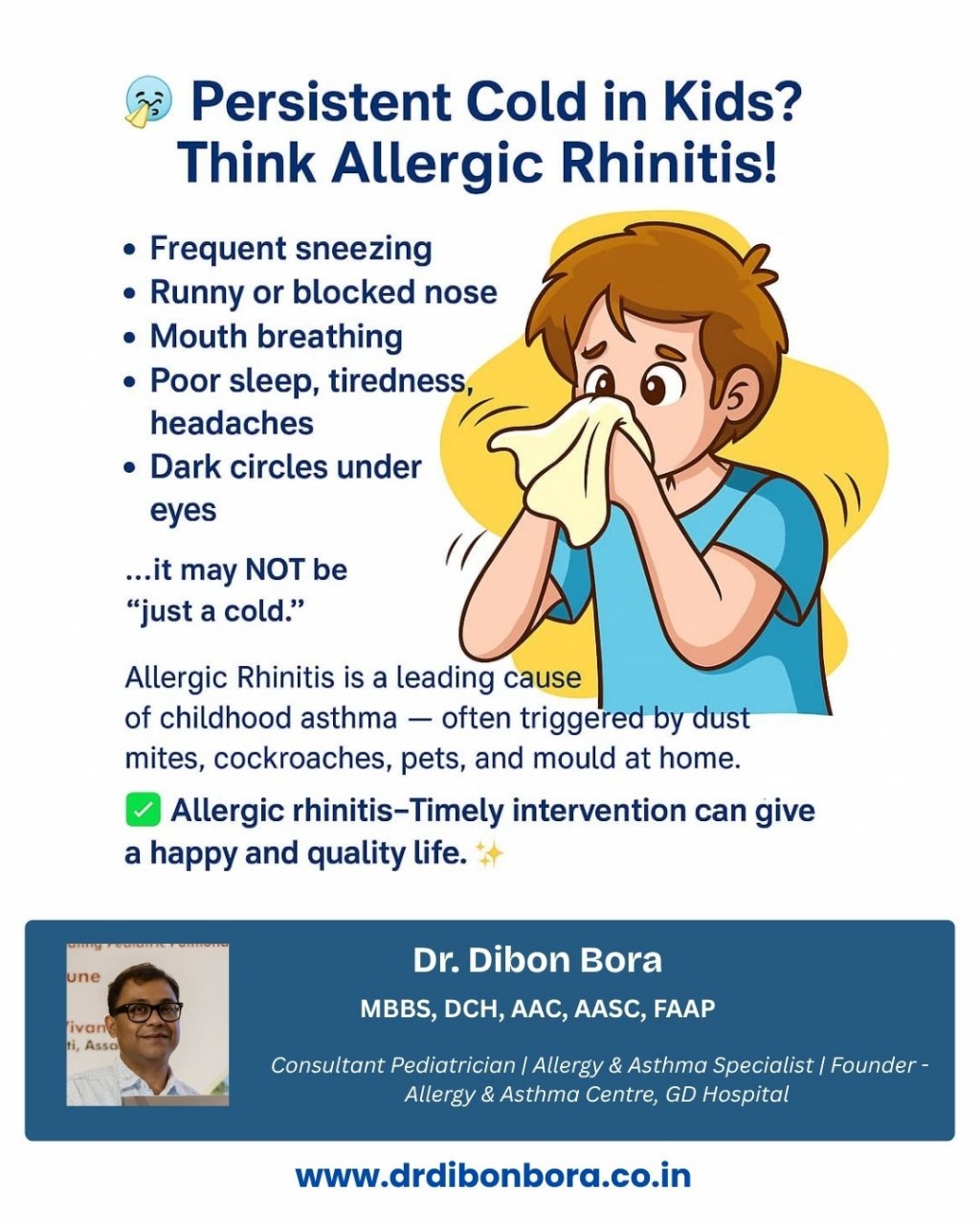A simple message and advies for parents and families to understand childhood asthma and its treatment
1. How does asthma usually begin in children?
Most of the time, it starts silently.In the beginning, we don't even realize there's a problem with the child. For example
- Slight cough while playing or eating
- Dry cough at night
- Same type of cough happening repeatedly
Gets tired easily with even a little running or playing
At first, we usually think it's just due to aweather change.So we start home remedies like honey, coughsyrups, antibiotics, or nebulizer...It helps a bit at first-but after a few days, thesame problem returns.
2. When the same symptoms keep repeating...
Gradually, a pattern begins to show:- Cough is worse at night
- Cough comes after running, laughing, or playing
- Child becomes okay for a few days, then cough returns again
- Cough improves with medicines but doesn't fully go away
This may not be a regular cough - this could be childhood asthma.The word "asthma" may sound scary, but don't be afraid.
It is a very common condition in children today and can be easily controlled.With the right treatment, your child can lead a
completely normal life.
3. What actually happens inside the body of these children?
Some children have very sensitive airways. Even mild triggers like dust, smoke, cold air, or viral infections can make the small airways inside their lungs swell up and narrow.This leads to symptoms like:
Night-time cough or difficulty in breathing
- Frequent cough
- Trouble breathing while playing
- Gets tired easily
Feels sleepy or tired during the day due to poor sleep at night
This is not due to weakness or infection - the lungs just need some care.
4. But remember - not all coughs mean asthma!Other causes can also be there, such as: Reflux of food into the lungs Other lung or breathing problems However, if Cough keeps coming back and is worse at night and dry in nature Child avoids or dislikes playing Asthma medicines improve symptoms Then the doctor may consider asthma as adiagnosis. But if there is wet cough, noisy breathing, very low weight, or very young age -the doctor will also look for other possible causes.
5. Asthma treatment is not a one-time cure - it's a journey
Many parents think that if the cough goes away, the asthma is cured. But actually, the problem inside the airways keeps recurring even if there are no visible symptoms. So, treatment should continue even when the child is well - using daily controller inhalers as advised by your doctor. Regular treatment Keeps the lungs healthy
Prevents sudden attacks Allows your child to go to school, play, and live normally Asthma treatment is not "just a course"- It's a journey of consistent care.
6. What's the most effective asthma treatment?
Using inhaler medicines is the most accepted and effective method worldwide.Why?
The medicine goes directly into the lungs Requires very low doses Has very few side effects Some common myths people believe: Inhalers are harmful or addictive Once started, it must be continued forever Nebulizers are better than inhalers
Truth - Inhalers are safe and widely used around the world.
- Asthma is not treated with cough syrups orantibiotics.
- Nebulizers are only for emergency use, not daily treatment.
- For regular use, inhalers with spacers and masks are best as per age.
7. Using the inhaler correctly is key! - The success of treatment depends on how well the inhaler is used.
If it's not used correctly, the medicine won't reach the lungs properly.
That's why during follow-up visits, the doctor checks:
Is the inhaler being used correctly?
Is the medicine finished?
Is the spacer clean and working properly?
Tip: Always bring your inhaler and spacer during follow-up visits.
8. For very young children (under 5 years)
They may frequently catch colds and have cough or breathing trouble with weather changes.
Not all of them have asthma.
Doctors may try a short trial of asthma treatment:
If it helps - treatment may be continued
If not - other causes will be investigated
This approach helps start correct treatment at
the right time.
9. When the treatment works - your child's life improves!
You'll seе:
Sleeping peacefully
Less coughing
Laughing, running, playing again
Gaining confidence
Important: Just because symptoms reduce, doesn't mean the disease is gone. Even during welltimes, medicines must be continued as per doctor's advice.
10. Regular doctor visits are a must
Asthma symptoms may change with:
Age
Season
Infections
So doctors must review treatment regularly to:
Assess symptoms
Adjust inhaler technique or dose
Perform lung tests (like spirometry or
oscillometry) as needed
Sometimes, allergy tests may also be done
11. What makes asthma worse?
Common triggers
Dust, smoke, mosquito coil fumes
Sudden cold wind
Perfumes or room sprays
Excessive crying, stress, or anger
Avoid these triggers - but remember, avoiding triggers is not enough alone.
12. Healthy habits can strengthen the lungs
Eat home-cooked food
Play regularly
Sleep well
No smoking at home
Follow doctor's advice properly
These habits make the child - and their lungs strong and healthy.
To summarize...
Childhood asthma often begins silently. But if we recognize it early and start correct treatment at the right timeYour child will:
- Sleep well
- Run and play
Laugh and grow with confidence
Asthma is not a weakness. Your child just needs gentle care for their small lungs.
Never ignore repeated cough in childhood.
Essential Asthma Care Instructions (Every parent must know):
Please follow these key steps for effective asthma control in your child:
• Asthma is a long-term condition - daily treatment is needed even when there are no symptoms.
Use inhalers correctly:- Shake well before
Always use with a spacer
Rinse mouth and spit after using steroid inhalers
Controller inhaler = for daily prevention
Reliever inhaler = to be used only during symptoms
Do not stop controller therapy without doctor's advice
• Avoid known triggers:
Dust
Smoke
Cold air
Strong smells (perfume, sprays)
Pets
PollenWatch for warning signs of poor control:
Night-time cough
Reduced physical activity
Needing reliever inhaler frequentlyFollow your personalized Asthma Action Plan given during consultation.
Clean spacer weekly:
Wash in running tap water
Do not touch the inside
Air dry in sunlight
• Check the inhaler dose counter
Replace the inhaler if it shows 40 or fewer
doses left
• Vaccinate annually (flu vaccine, pneumococcal
if advised)
• Prefer pMDI with spacer over nebulizers for
regular use
Nebulizers are reserved for emergencies only
• Attend regular follow-ups (every 1-3 months or as advised)
Bring all medicines, inhalers, spacers, and devices to each visit
• Lung function tests (e.g., spirometry, oscillometry) may be recommended to monitor control and guide therapy.
Allergen Immunotherapy may be considered in selected allergic children - your doctor will guide you if appropriate.
Let's keep asthma under control - for every breath, every day.
Thank you,
Dr. Dibon Bora
1/06/2025
Assam
India



Add a Comment